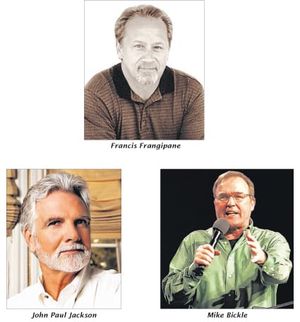Our goal – get everyone speaking in tongues. We were leaders in the Jesus and charismatic movements of the 1960s and 1970s. Not that we purposely cast evangelism aside. But if we could get people speaking in tongues then we would know for sure they were indeed Christians (since a person had to have the Spirit in order to speak in tongues).
It seemed to us quite obvious and it streamlined our evangelism. And once people were introduced to the Spirit who was ‘doing new things in these last days’, almost anything was possible.
Excesses
Following close on the heels of the charismatic and Jesus movements were a number of other false teachings among which was the ‘shepherding’ movement. The success of the shepherding movement depended on people believing that God was doing things differently in the last days and, therefore, that new practices and doctrines did not have to be corroborated by the Bible.
Once this notion was accepted, the leaders effectively had carte blanche – and they took advantage of it. This aberration is gone now, its leadership has disbanded, some are dead and yet others saw their error and repented of it.
But the driving principle is instructive: when people are opened up to the ‘Spirit’ doing ‘new things’, almost anything goes. Here is an example.
One leader of the River Revival (see below) says he sat at the feet of Jesus for 45 days in heaven. He was then sent back to earth and commissioned to preach what he learned. Few would be deceived by such an outlandish story, but in the River Revival there is no way to counter the claim and the message, because God is ‘doing new things’.
The River Revival
The River Revival, also known as the Toronto Blessing or Laughing Revival, spread quickly through Pentecostal and charismatic churches. Not all such churches were open to it but many were.
The movement is still growing here in the USA at the beginning of this 21st century, though not as rapidly as it was. But it is finding new ground – the conversion of traditionally non-charismatic churches into churches open to the charismatic gifts, especially speaking in tongues.
This particular ‘gift’ is always featured because it is the doorway into all the rest of it. And a powerful vehicle for bringing tongues to mainline churches today is the Alpha Course.

Alpha Course
Developed at the Holy Trinity (Anglican) Church, Brompton, UK, it is a 15-lesson course designed primarily to move people into speaking in tongues. The proponents of the course would not describe it in this way. They would argue that it is aimed at reaching the unchurched.
But as I consider the course, I believe that this is exactly what is going on. For the most part I find the theology behind the Alpha Course is generally biblical, but the course is disproportionately centred on the person and work of the Holy Spirit rather than on Christ. It would seem, based on the focus of the course, that the Holy Spirit’s ministry is to glorify the Holy Spirit, particularly in the ‘gift of tongues’.
Just as in the charismatic and Jesus movements of previous years, once the gift of tongues is experienced, then a whole range of new spiritualities come right along with it; which is the essential premise of the River Revival, namely, that God is doing new things in these last days.
It is not surprising, then, that the Brompton church was (and continues to be) involved in the Toronto Blessing. Churches that promote the Alpha Course may, and often do, move right into the Toronto Blessing and all the extremes that go with it.
What I have learned
I am not suggesting that there is a conspiracy between those who promote the Alpha Course and the River Revival, whereby one feeds off the other as a purposeful strategy. But there is nevertheless a causal connection.
The direction, goals and activities of a church may be significantly altered once it becomes charismatic. And once a church turns charismatic, in my experience, the River Revival may not be far behind (and if not the River Revival itself, then something like it).
My experience is limited, I admit, but for the last three years I have received dozens of e-mail communications from pastors and others in churches that have been taken over by the River Revival or something similar, and have heard many a horror story.

When I find Baptist, Lutheran, Methodist, Episcopal, and other churches that started with the Alpha Course and ended up with the full-blown River Revival, I start to put two and two together.
I should say that some pastors have used an altered version of the Alpha Course with some good result. They have changed it around somewhat, beefed it up theologically, rejected the ‘user friendly’ omission of central aspects of the gospel, and minimized or skipped the emphasis on speaking in tongues.
I once considered doing this myself, but only briefly. It is best left well alone.
Overreacting?
Am I overreacting and castigating a good thing? Perhaps; but I would rather err on the side of caution than endorse what I see going on. And it comes my way via the Internet nearly every day.
Can I ignore this? Can these people who report confusion, division, and questionable theology and practices, be all dismissed as ‘resisting the work of God’ or the ‘tools of the devil’?
No, they cannot be dismissed in this way. My correspondents seem to be sincere believers who see their churches being hijacked and carried away into extremes of doctrine and practice.
They are jealous for the gospel and the honour of God, and are grieved at what they are seeing. So ought we to be. As we speak the truth in love, and proclaim the gospel of God’s free grace in Christ, we must strive to show a wayward generation the way back to authentic, biblical Christianity.



















